Ever have those days where your mind feels like it’s stuck in slow motion? You’re staring at your to-do list, but your thoughts are scattered, your focus is gone, and no amount of coffee is snapping you out of it. Welcome to the world of brain fog—a common struggle for students, professionals, parents, and honestly, just about everyone. But here’s the good news: you don’t need prescription drugs to dial up your focus and reclaim your mental clarity. Your everyday choices have a bigger impact than you might think.
What Is Mental Clarity and Why Do We Lose It?
Mental clarity is that sweet spot where you feel sharp, clear-headed, and able to tackle whatever life throws your way. It’s the difference between breezing through your workday and spending an hour staring blankly at your screen. But why do we lose it?
Stress, poor sleep, a junk-food diet, and a constant stream of digital distractions can all leave your brain feeling foggy. Even being dehydrated or skipping meals can tank your focus. The good news? Most of these factors are totally within your control.

Can You Really Improve Focus Without Prescription Drugs?
Absolutely. There’s a huge movement of people ditching Adderall, Ritalin, and other prescription drugs in favor of lifestyle tweaks and natural focus boosters. Why? Because for most people, building healthy routines, eating brain-friendly foods, and managing stress is safer, more sustainable, and often just as effective for mental clarity as popping a pill. Plus, you avoid nasty side effects, dependency, and the “crash” that comes with many prescription drugs.
If you want to know how to boost mental clarity naturally, you’re in the right place. Let’s start with the foundation of every focused, high-performing brain: sleep.
Sleep: The Secret Weapon for Mental Focus
You can load up on coffee and supplements, but if you’re running on empty when it comes to sleep, your brain just won’t cooperate. Sleep is your brain’s reset button. It’s when your body cleans out toxins, consolidates memories, and recharges for the next day.
How Poor Sleep Causes Brain Fog
When you skimp on sleep, your brain starts glitching. Decision-making slows down, memory slips, and your ability to concentrate tanks. Chronic sleep deprivation even ramps up your stress hormones and inflammation, making brain fog and fatigue even worse.
A single bad night’s sleep can leave you feeling groggy. String together a few, and suddenly you’re struggling to remember things, stay organized, or get anything done. It’s no wonder so many people are searching for ways to boost mental clarity and focus—when often, the solution is simply getting better rest.
Habits for Better Sleep and Sharper Thinking
-
Keep a regular schedule: Go to bed and wake up at the same times—even on weekends.
-
Ditch screens before bed: The blue light from your phone or laptop tricks your brain into thinking it’s still daytime.
-
Create a sleep sanctuary: Make your room cool, quiet, and dark.
-
Wind down: Try reading, meditation, or gentle stretching before bed.
Remember: quality is just as important as quantity. Even seven hours of deep, uninterrupted sleep can do more for your focus than ten hours of tossing and turning.
Eat for a Clear Mind: Brain-Boosting Nutrition
Food isn’t just fuel for your body—it’s brain fuel, too. The right diet can dramatically improve your focus, mood, and memory.
The Best Foods for Mental Clarity
If you want to boost mental clarity naturally, aim to eat more of these focus-friendly foods:
-
Fatty fish: Salmon, sardines, and trout are loaded with omega-3 fatty acids, which help build healthy brain cells.
-
Leafy greens: Spinach, kale, and broccoli deliver vitamins and antioxidants that protect your brain from stress.
-
Berries: Blueberries, blackberries, and strawberries contain compounds shown to improve memory and slow cognitive decline.
-
Eggs: Packed with choline, which is vital for memory and brain development.
-
Nuts and seeds: Walnuts, almonds, and pumpkin seeds provide vitamin E and other nutrients linked to slower cognitive decline.
-
Whole grains: Oats, brown rice, and quinoa give your brain steady energy throughout the day.
And don’t forget water! Even mild dehydration can zap your focus and slow your thinking.
Foods and Drinks That Sabotage Focus
Some foods drain your mental energy. Watch out for:
-
Sugary snacks: They give you a quick rush, followed by a crash.
-
Highly processed foods: Chips, pastries, and fast food are low on nutrients and high on brain-fog triggers.
-
Too much caffeine: A little helps, but too much can leave you jittery, anxious, and—ironically—less focused.
-
Alcohol: Even moderate drinking can leave you sluggish and foggy the next day.
Eating for mental clarity isn’t about being perfect—it’s about giving your brain the nutrients it needs to thrive, most of the time.
Move Your Body, Clear Your Mind
You don’t have to be a gym rat to benefit from exercise. Regular movement is one of the most effective, science-backed ways to boost focus and beat brain fog—no prescription needed.
Exercise and Its Surprising Impact on Focus
Physical activity increases blood flow to the brain, delivers oxygen and nutrients, and triggers the release of feel-good chemicals like dopamine and endorphins. It even helps your brain grow new neural connections, which can improve memory and problem-solving skills.
A quick walk, ten minutes of stretching, or a dance break in your living room is enough to give your mind a noticeable lift.
Simple Workouts to Start Today
-
Take a brisk 20-minute walk during your lunch break.
-
Do a short YouTube workout in your living room.
-
Try yoga or tai chi for a double hit of movement and mindfulness.
-
Bike, swim, or play a sport—whatever gets you moving and having fun.
If you’re feeling mentally sluggish, physical movement is often the fastest way to get back on track.

Natural Supplements for Focus and Memory
Sometimes, you want an extra edge—and that’s where safe, natural supplements come in. No need to mess with prescription drugs when the right vitamins and herbs can give you a boost.
Safe Nootropic Alternatives to Prescription Drugs
-
L-theanine: Found in green tea, it calms the mind without making you sleepy—perfect with a little caffeine for smooth, sustained focus.
-
Rhodiola rosea: This adaptogen helps your body handle stress and fatigue.
-
Bacopa monnieri: Traditionally used to support memory and learning.
-
Ginkgo biloba: May improve circulation to the brain and support clear thinking.
Always use supplements from reputable brands, and talk to your doctor if you’re taking other medications or have health concerns.
Key Vitamins and Herbs for Cognitive Support
-
B vitamins (B6, B9, B12): Essential for energy and healthy brain function.
-
Vitamin D: Linked to mood and cognitive health—most people need more, especially in winter.
-
Omega-3s: Fish oil or algae supplements are great if you don’t eat much fish.
-
Ginseng: May help boost focus and mental energy.
Supplements aren’t magic pills, but they can support your journey to better mental clarity—especially when you’ve already dialed in your sleep, diet, and exercise.
Mindfulness and Meditation: Training Your Brain to Pay Attention
In a world packed with notifications, noise, and endless to-dos, training your mind to focus is a real superpower. That’s where mindfulness and meditation come in—not just as buzzwords, but as practical, science-backed tools for mental clarity.
How Mindfulness Boosts Mental Clarity
Mindfulness is simply the practice of being fully present in the moment. It helps you notice when your mind is wandering and gently brings your attention back to what matters. Studies show regular mindfulness practice can:
-
Reduce stress and anxiety (big-time focus killers)
-
Improve working memory and attention span
-
Lower reactivity to distractions, so you can stay on task longer
You don’t have to sit cross-legged for hours. Just five minutes of focused breathing or a quick body scan can shift your brain from scattered to centered.
Easy Mindfulness Practices for Busy People
-
Box breathing: Inhale for four seconds, hold for four, exhale for four, and pause for four. Repeat a few times.
-
Body scan: Close your eyes, breathe deeply, and scan your attention from your toes to your head.
-
Mindful walking: Take a slow walk, noticing each step and the sensations in your body.
-
Guided meditation: Try apps like Headspace, Calm, or Insight Timer.
The more you practice, the easier it gets to access that “focused and clear” feeling—even on busy days.
Mastering Your Environment for Better Concentration
Your surroundings have a huge impact on your ability to focus. A messy desk, noisy space, or constant notifications can wreck your mental clarity—even if you’re doing everything else right.
Creating a Distraction-Free Workspace
-
Declutter: Keep only what you need on your desk. Store away papers, snacks, or gadgets you don’t use often.
-
Comfort counts: Invest in a good chair, add a plant, and let in natural light.
-
Set up zones: Have a dedicated spot for focused work, separate from where you relax.
Even a few small changes can help signal to your brain, “It’s focus time.”
Digital Detox and Managing Notifications
-
Silence your phone: Use “Do Not Disturb” or airplane mode during focus time.
-
Batch your emails: Check at set times instead of constantly refreshing.
-
Use tech to your advantage: Try browser extensions that block distracting sites (like Freedom or StayFocusd).
-
Schedule social media: Give yourself a set window to scroll, then log off.
A little digital discipline goes a long way for focus and mental clarity.
Stress Less, Think More Clearly
Chronic stress is one of the biggest reasons for brain fog, poor focus, and even memory issues. The body’s stress hormones (like cortisol) make it almost impossible to think clearly. If you want laser-sharp mental clarity, it pays to make stress relief part of your daily routine.
The Link Between Stress and Brain Fog
When you’re stressed, your body goes into “fight or flight” mode. That might help you in a real emergency, but it leaves you distracted, anxious, and forgetful in everyday life. Over time, high stress drains your energy, tanks your motivation, and keeps you stuck in a mental fog.
Quick Stress-Relief Techniques for Focus
-
Deep breathing: Just a few slow, deep breaths can lower stress and refocus your mind.
-
Get outside: Nature is a proven mood and clarity booster—even five minutes in fresh air helps.
-
Mini breaks: Stand up, stretch, or do a quick body shake every hour.
-
Journaling: Dump your worries on paper to make space in your mind.
Remember: Taking care of your stress isn’t lazy—it’s what lets your brain perform at its best.
Building Healthy Routines for Lasting Focus
One-off hacks are cool, but it’s your daily routines that really shape your mental clarity over time. Little habits, done consistently, have a huge impact.
Morning Habits for a Sharp Mind
-
Hydrate first thing: Drink a glass of water before coffee to rehydrate your brain.
-
Move your body: Even a quick stretch or walk wakes up your mind.
-
Eat breakfast: A mix of protein and healthy carbs sets you up for steady energy.
-
Plan your priorities: Write down the top 2–3 things you want to accomplish.
Start your day with intention and watch your focus last longer.
Evening Wind-Down Rituals
-
Dim the lights: Signal to your brain that it’s time to rest.
-
Cut out screens 30–60 minutes before bed: Help your brain wind down naturally.
-
Reflect and journal: Write out what went well and what you’ll tackle tomorrow.
-
Gratitude practice: End the day with a positive thought to reduce stress and sleep better.
Solid routines help your body and mind know what to expect—making it way easier to show up focused, day after day.
When to Seek Professional Help for Brain Fog
Most of the time, brain fog is fixable with lifestyle changes. But if you’re struggling to concentrate for weeks, or brain fog is seriously impacting your work, school, or relationships, it’s smart to get help.
Red Flags and Deeper Health Issues
See a doctor or mental health pro if you notice:
-
Brain fog that never goes away, no matter what you try
-
Sudden memory problems or confusion
-
Trouble with speech, vision, or balance
-
Major mood changes, anxiety, or depression
Sometimes, medical conditions (like thyroid problems, vitamin deficiencies, ADHD, or depression) are at the root of poor focus. Getting professional advice means you’ll get the right treatment and get back to feeling your best.
Conclusion: Take Control of Your Mental Clarity Today
Boosting mental clarity without prescription drugs isn’t just possible—it’s the natural way our brains were designed to thrive. With better sleep, mindful routines, real food, movement, stress management, and a distraction-free environment, you can unlock the sharp, focused mind you need for work, study, and life.
Start small, stay consistent, and remember: mental clarity is a daily choice. Your brain will thank you!
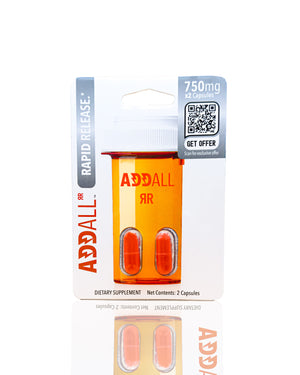
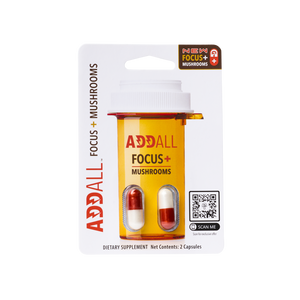

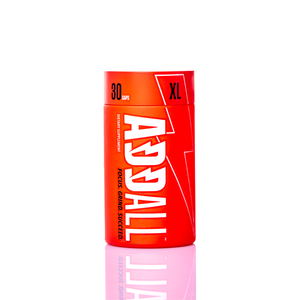
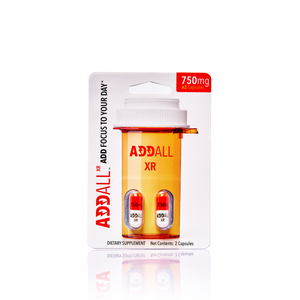

 Addall XR
Addall XR
 Addall XL
Addall XL
 Addall
Addall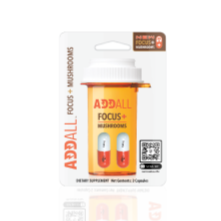 Addall
Addall Addall
Addall
 Compare
Compare




















































